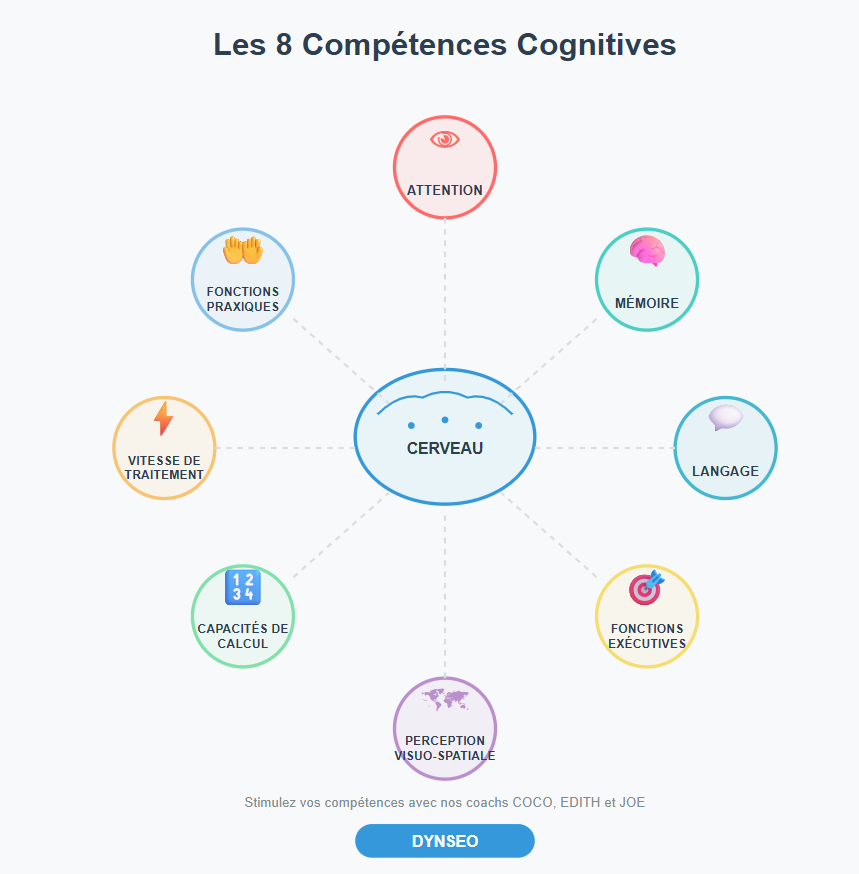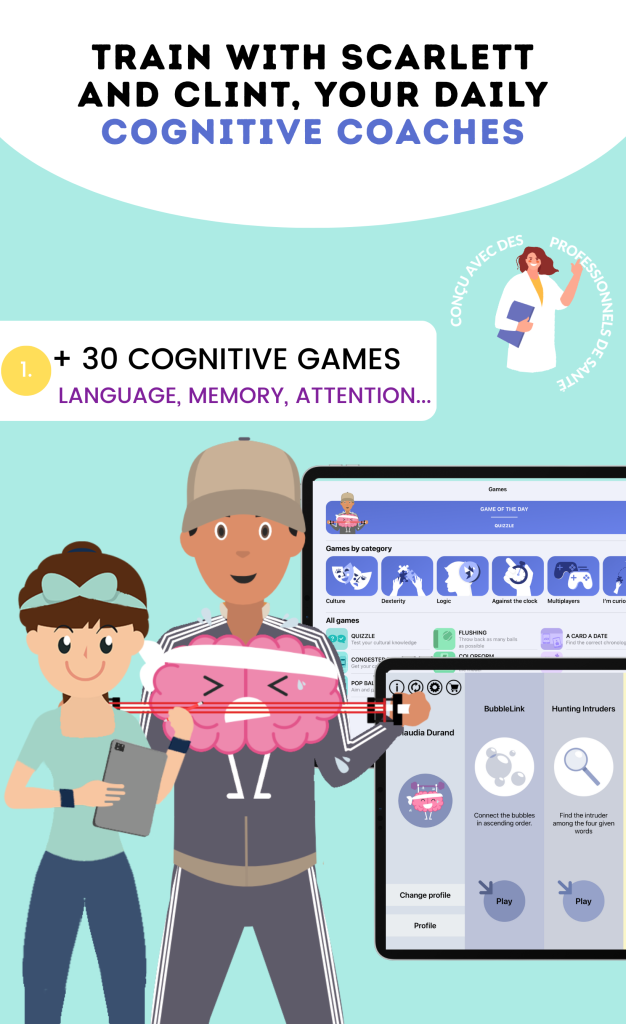What are the 8 cognitive skills?
Our brain is an extraordinary machine made up of nearly 86 billion neurons that allow us to perceive, understand, and interact with the world around us. This ability relies on eight fundamental cognitive skills that we use daily, often without even realizing it. Understanding these skills is essential for maintaining our brain health and optimizing our mental performance at any age.
These cognitive functions never operate in isolation: they constantly interact to enable us to accomplish the simplest to the most complex tasks. A simple drive, for example, simultaneously engages our attention (monitoring the road), our memory (knowing the route), our executive functions (making decisions), and our visuospatial perception (evaluating distances).
1. Attention: the gateway to information
Attention serves as the filter that determines which information from our environment will be processed by our brain. In a world saturated with stimuli, this skill becomes crucial for our daily efficiency.
It comes in several distinct forms. Sustained attention allows us to maintain our focus on a task for an extended period, such as reading this book or following a lecture. Selective attention helps us concentrate on a particular element while ignoring distractions, for example, listening to our conversation partner in a noisy restaurant. Divided attention, which is more complex, enables us to manage multiple tasks simultaneously, such as driving while listening to the radio.
Attention evolves throughout life: it gradually develops in children, peaks in young adults, and may decline with age or be affected by stress and fatigue. That’s why our coaches COCO, SCARLETT, and CLINT offer targeted exercises to strengthen the different types of attention according to the specific needs of each age group.
2. Memory: our personal library
Memory is one of the most complex functions of our brain. It allows us not only to retain our personal memories but also to learn new skills and accumulate knowledge.
The memory process includes three stages: encoding (transforming information into memory traces), storage (consolidating and maintaining information), and retrieval (accessing stored information). Short-term memory allows us to temporarily hold a small amount of information (like a phone number), while working memory enables us to manipulate this information mentally.
Long-term memory, which is more extensive, is subdivided into several systems. Episodic memory stores our personal memories with their temporal and spatial context (our first day of school, our last meal). Semantic memory contains our general knowledge about the world (Paris is the capital of France, birds fly). Procedural memory, on the other hand, manages our automatic skills and motor know-how (riding a bike, playing the piano).
SCARLETT, our coach specifically designed for seniors, offers tailored exercises to stimulate all these types of memory. Activities include progressive memorization games, image association exercises, and general knowledge quizzes that engage different memory systems.
3. Language: our complex communication tool
Language is probably one of the most sophisticated skills of human beings. It allows us not only to communicate but also to structure our thoughts and transmit our culture.
Language skills encompass four main dimensions: listening comprehension (decoding spoken messages), oral expression (producing coherent speech), reading (decoding written text), and writing (producing text). These skills involve different levels of processing: phonology (recognizing and producing sounds), morphology (understanding the structure of words), syntax (mastering grammatical rules), semantics (understanding meaning), and pragmatics (adapting speech to context).
Language development follows a remarkable progression: from passive listening in utero to first words around 12 months, then to the lexical explosion of the second year and gradual syntactic mastery. COCO, our app dedicated to children aged 5 to 10, supports this evolution with progressive language games that enrich vocabulary, develop comprehension, and stimulate expression.
4. Executive functions: our mental conductor
Executive functions represent high-level cognitive processes that orchestrate and control other brain functions. They are essential for appropriate behavior and independent living.
These functions include planning (setting goals and organizing steps to achieve them), mental flexibility (adapting to changes and switching from one task to another), inhibition (controlling impulses and resisting automatism), and updating (constantly refreshing information in working memory).
In professional life, these skills are crucial: managing a project requires planning, adapting to new software demands flexibility, and resisting the temptation to check emails during an important meeting requires inhibition. CLINT, our coach for active adults, offers stimulating challenges that engage these executive functions through strategy games, planning exercises, and complex problem-solving tasks.
5. Visuospatial perception: navigating a three-dimensional world
This fundamental skill allows us to perceive, analyze, and understand the visual and spatial information in our environment. It encompasses shape recognition, spatial orientation, distance estimation, mental rotation of objects, and the construction of spatial representations.
Visuospatial perception is involved in many activities: reading a map, parking a car, recognizing a face in a crowd, assembling furniture, or appreciating a work of art. It involves complex brain networks, primarily located in the right hemisphere.
Our three coaches integrate visuospatial exercises tailored to their audience: colorful puzzles and shape games for COCO that develop spatial structuring in children, pattern recognition and orientation exercises for SCARLETT that maintain these abilities in seniors, and mental rotation and spatial navigation challenges for CLINT that optimize these skills in active adults.
6. Calculation skills: mastering the universe of numbers
Numerical skills go far beyond simple arithmetic. They encompass intuitive understanding of quantities (number sense), basic arithmetic operations, complex mathematical reasoning, and solving numerical problems in various contexts.
These abilities rely on specialized brain mechanisms, particularly in the parietal regions, and closely interact with other cognitive functions. Working memory is engaged to retain the steps of a calculation, attention to focus on operations, and executive functions to plan the resolution of a complex problem.
In daily life, we constantly use these skills: calculating change, estimating travel time, comparing prices, or managing a household budget. Our coaches offer progressive exercises ranging from simple operations to complex logical problems, tailored to each level and age.
7. Processing speed: cognitive efficiency
Processing speed refers to how quickly our brain can receive, analyze, and respond to information. This skill underlies our performance in many cognitive tasks and influences our overall efficiency.
It varies significantly among individuals and evolves with age: it increases during childhood and adolescence, stabilizes in adulthood, and then tends to slow down naturally with aging. This slowdown can be compensated by experience and regular training.
SCARLETT offers exercises specifically designed to maintain and improve this processing speed: quick reaction games, accelerated visual processing exercises, and fine discrimination tasks that stimulate cognitive efficiency while respecting each user’s pace.
8. Praxic functions: the harmony between thought and action
Praxis represents our ability to plan, program, and execute voluntary and coordinated gestures. This complex skill links our cognitive intentions to their motor realization.
They allow us to use tools (ideomotor praxis), perform symbolic gestures like greeting (ideatory praxis), dress or groom ourselves (dressing praxis), and organize complex gesture sequences like cooking an elaborate dish (constructive praxis).
Praxic disorders can significantly impact daily autonomy, highlighting the importance of regularly stimulating these functions through varied and progressive activities.

The DYNSEO approach: scientific and personalized cognitive stimulation
At DYNSEO, we have developed our three cognitive coaches based on the latest research in cognitive neuroscience. Each specifically targets the needs of its audience while stimulating all eight skills in a balanced manner.
COCO THINKS and COCO MOVES supports children aged 5 to 10 in their cognitive development with over 30 educational games. The colorful and playful interface respects learning rhythms while offering an adapted progression. The activities simultaneously develop several skills: a memory game stimulates visual memory and attention, while a puzzle develops visuospatial abilities and executive functions.
SCARLETT specifically addresses seniors with a caring approach to cognitive aging. The clean interface and clear instructions facilitate use, while the exercises are calibrated to maintain autonomy and slow down natural cognitive decline. The program includes reminiscence activities that stimulate episodic memory, attention exercises adapted to seniors’ pace, and strategy games that maintain executive functions.
CLINT targets active adults who wish to optimize their mental performance in a demanding professional context. The proposed challenges simulate complex everyday situations: managing multiple projects simultaneously (divided attention and executive functions), memorizing technical information (working memory), or quickly solving logical problems (processing speed and reasoning).
The benefits of regular cognitive training
Scientific research shows that regular cognitive training can improve mental performance at any age. In children, it promotes the harmonious development of skills and can enhance academic performance. In adults, it maintains cognitive efficiency and can reduce the effects of stress on the brain. In seniors, it helps preserve autonomy and can slow down certain aspects of cognitive aging.
Training is even more effective when it is varied, progressive, and tailored to individual needs. That’s why our coaches automatically adjust the difficulty according to each user’s performance and offer diverse exercises that engage different skills.
Conclusion: cultivating cognitive potential throughout life
These eight cognitive skills form a complex and interdependent ecosystem that determines our ability to function effectively in modern society. Like any biological system, our brain follows the principle “use it or lose it”: functions that are regularly engaged are maintained and strengthened, while those that are neglected weaken.
Cognitive training is not an additional burden, but an investment in our future quality of life. Whether you are a parent concerned about providing your child with all the assets for success, an active adult seeking to maintain your performance in a competitive environment, or a senior wishing to preserve your independence, our cognitive coaches support you in this essential endeavor.
The beauty of brain plasticity lies in its ability to adapt at any age. It is never too early or too late to start stimulating your brain. The important thing is not to aim for perfection, but for regularity and progression. A few minutes of daily exercises, practiced with pleasure and relaxation, are enough to maintain these precious skills that allow us to navigate successfully through the complexity of the contemporary world.




